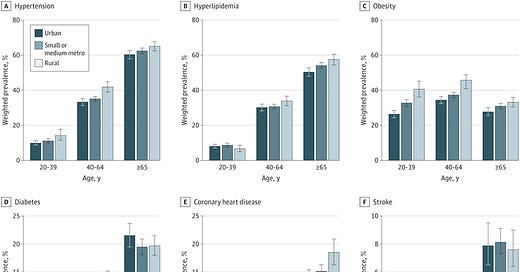Cardiovascular risk based on residence
Source: Liu, et al JAMA Cardiology March 31, 2025
Researchers analyzed data from the National Health Information Survey to assess risk for cardiovascular disease and for cardiovascular disease. This was a large survey (over 27,000 respondents), and about 14% of respondents lived in rural counties, 31% lived in urban counties, and 55% lived in small or medium metropolitan counties. Their analysis was published in JAMA Cardiology.
They found that rural adults were more likely to smoke, and on an age-adjusted basis were statistically significantly more likely to have high blood pressure, high cholesterol, obesity, diabetes, and heart disease. There was no statistically significantly increased risk of stroke in rural residents. These differences were not explained by insurance coverage, although most risk factors were associated with increased poverty, decreased educational level, and increased food insecurity.
Meanwhile, an analysis by Avalere shows that rural areas lost 2,500 physicians (5%) between 2019-2024, and the number of physicians in rural independent practices declined from about 22,000 to about 12,500 (43%), with most moving to corporate or hospital ownership.
And a report on Wednesday from KFF Health News shows how the lack of high-speed internet impairs care at rural hospitals.
Implications for employers:
Medical needs in rural communities continue to increase, while the number of available practitioners declines.
Virtual care can meet some of this need although delays in rural broadband rollouts mean that some lack adequate internet access.
Financial and food insecurity continue to be associated with increased health care risk and poor health outcomes.
Some employers have developed onsite clinics to meet the health needs of their employees in rural areas and in communities with poor access to clinical services.
Thanks for reading. You can find previous posts in the Employer Coverage archive
Please subscribe, “like” share this newsletter with friends and colleagues. Thanks!
Tomorrow: Tariffs could fuel further medical inflation



